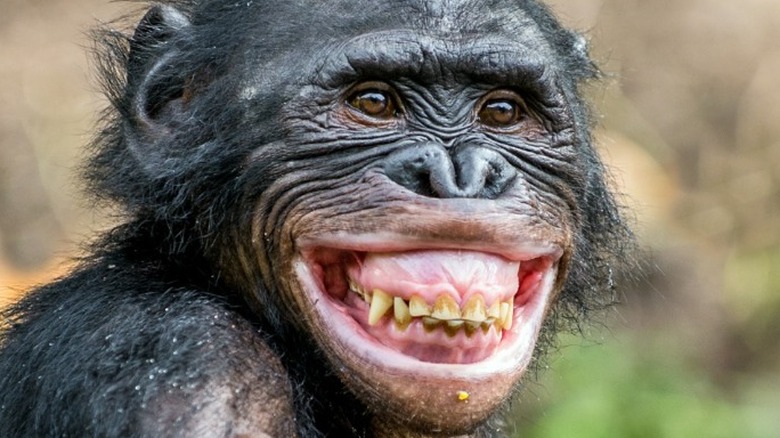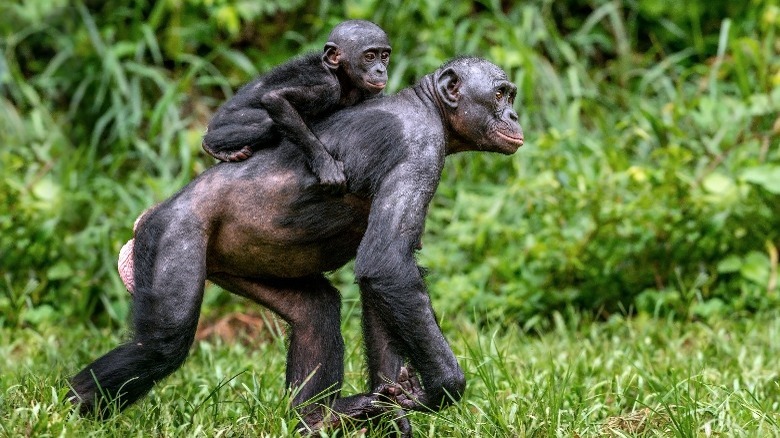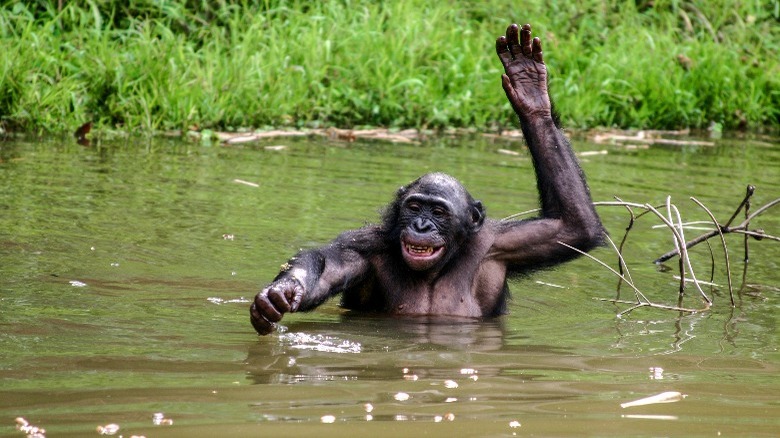Why The Name Of The Bonobo Ape Might Actually Be Meaningless
Over the past 100 years, since its recognition as a separate species from the chimpanzee, the bonobo ape has had a lot of different names. These have included gracile ape, lesser chimpanzee, pygmy chimpanzee, dwarf chimpanzee, and black-faced chimpanzee.
Scientists have advocated for the name bonobo over all the others, in part because, according to primatologist Frans de Waal, "its happy ring ... befits the species' nature" (via Friends of Bonobos). According to "Bonobo: The Forgotten Ape" (excerpted at The New York Times), bonobos are known to be playful, having been observed tickling each other and even laughing. They also engage in nonreproductive sex and exhibit sexual pleasure. This is unusual in non-human animals, but then again, bonobos are one of the closest species to our own.
Though they are also closely related to chimpanzees, scientists recently have begun to reject names like pygmy, dwarf, and lesser chimpanzee for bonobos. The University of Wisconsin notes that designations like pygmy and dwarf are inaccurate because bonobos are about the same size as chimpanzees. The Friends of Bonobos website adds that these names are demeaning, suggesting that bonobos are less important than chimps.
What does bonobo mean?
So where does the unusual name "bonobo" come from? There's some debate about that. The most common explanation is that it was actually a mistake. The species was differentiated from chimpanzees in the 1920s, and the story goes that around that time, a crate with specimens of the species was sent to Belgium from Bolobo, Zaire, a Congo River port (now in the Democratic Republic of the Congo). The L in Bolobo was obscured by the time the crate arrived in Belgium, thus the species was erroneously given the name bonobo instead. However, Oxford English Dictionary says this story can't be substantiated (via Friends of Bonobos).
Another possible explanation for the origin of the name comes from researchers Eduard Tratz and Heinz Hock, who studied the behavior of bonobos in the 1950s. They claimed the word came from a proto-Bantu language root meaning "ancestor" — a logical meaning, given the closeness between bonobos and humans. They said their source was a Belgian missionary who had studied Bantu languages. However, according to Friends of Bonobos, the indigenous names for these animals in the Congo region don't resemble the word bonobo.
An endangered species
"Bonobo: The Forgotten Ape" (via The New York Times) points out that the bonobo's other names, including pygmy chimpanzee, have unfortunately led to some scientists referring to chimpanzees as "common chimpanzees" instead. This name is misleading because chimpanzees are an endangered species, and therefore a bit rare, rather than common.
A less problematic name for bonobos, though also less commonly used, is gracile ape. This name refers to their build, which is slimmer than that of chimpanzees.
Bonobos are also endangered, and according to The University of Wisconsin, the number of bonobos in the wild is currently unknown, though in 2016, the International Union for Conservation of Nature's Redlist estimated it at around 15,000-20,000. There are about 150 bonobos in captivity in zoos and elsewhere. In the wild, bonobos can only be found in the Democratic Republic of the Congo, specifically between the Congo-Zaire-Walaba River and the Kwa-Kasai-Sankuru River. They were previously also found in Angola (via The New York Times).


